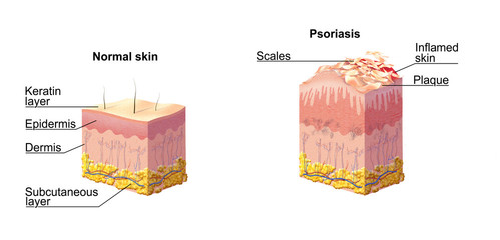I don't know about you my Sexy guys but I feel like once Halloween is done and dusted we are overwhelmed with special events in November!
But for now, let's talk about this week's awareness campaign!
This week (1-8 November) is not about cancer, it's about raising awareness for a condition that affects millions of us around the world: PSORIASIS.
Psoriasis
Psoriasis is an auto-immune condition that affects the skin and joints. About 2-3% of people living in the United Kingdom are affected. That's about 1.8 million people!!!
Basically, it's when flaky skin appears as a result of the regular process of skin cell replacement being sped up.
Our skin cell replacement happens every 21-28 days but in the case of psoriasis, it can be soon as every 2 to 6 days.
The scaliness on the skin is caused by a build up of cells that will be shed and the redness will appear as a result of the blood vessels pumped to support the process!
Different types of psoriasis
Anyone can develop it and at any time: adults, children, older people, although there seems to be two peak times: from the late teens to early thirties, and between the ages of around 50 and 60.The most common type people develop is called 'plaque psoriasis' and appears commonly on certain parts of the body like the elbows and scalp. It affects about 8 out of 10 Psoriasis sufferers.
Other types include guttate, invert and pustular.
Some people will have a family history of the condition, but others may not. You cannot catch psoriasis from a sufferer!
A flare-up of psoriasis can be triggered by a number of factors, such as stress or anxiety, injury to skin, hormonal changes, or certain infections or medications
Mechanism
Recent research has found that the psoriasis-causing changes in the skin begin in the immune system when certain immune cells (T cells) are triggered and become overactive. The T cells act as if they were fighting an infection or healing a wound, which leads to them producing inflammatory chemicals, again leading to the rapid growth of skin cells causing psoriatic plaques to form.To find out about more types of psoriasis, click here.
Treatments
Called topical therapies, these include creams, lotions and gels. Ultraviolet light used in
phototherapy and biologics are also all available.
More info?
About Psoriasis Awareness Week
So, my dear Sexy Readers, do you know anyone who suffers from Psoriasis?
See you Soon for more Sexy Science,




0 Sexy People gave their opinion:
Post a Comment
Note: only a member of this blog may post a comment.